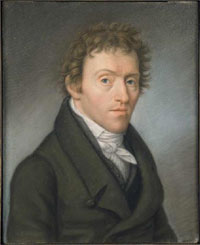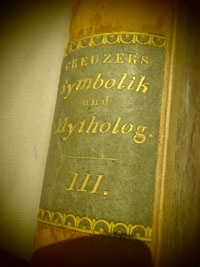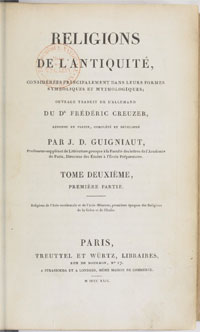



Georg Friedrich Creuzer
Marburg 1771 - Heidelberg 1858
German philologist and archaeologist, was born on the 10th of March 1771, at Marburg, the son of a bookbinder. Having studied at Marburg and Jena, he for some time lived at Leipzig as a private tutor; but in 1802 he was appointed professor at Marburg, and two years later professor of philology and ancient history at Heidelberg. The latter position he held for nearly forty-five years, with the exception of a short time spent at the university of Leiden, where his health was affected by the Dutch climate. He was one of the principal founders of the Philological Seminary established at Heidelberg in 1807. The Academy of Inscriptions of Paris appointed him one of its members, and from the grand-duke of Baden he received the dignity of privy councillor. He died on the 16th of February 1858. Creuzer’s first and most famous work was his Symbolik und Mythologie der alten Völker, besonders der Griechen (1810–1812), in which he maintained that the mythology of Homer and Hesiod came from an Eastern source through the Pelasgians, and was the remains of the symbolism of an ancient revelation. This work was vigorously attacked by Hermann in his Briefen über Homer und Hesiod, and in his letter, addressed to Creuzer, Über das Wesen und die Behandlung der Mythologie; by J. H. Voss in his Antisymbolik; and by Lobek in his Aglaophamos. Of Creuzer’s other works the principal are an edition of Plotinus; a partial edition of Cicero, in preparing which he was assisted by Moser.
(1911 Encyclopedia Britannica)
Main works: Die historische Kunst der Griechen (1803); Epochen der griechischen Literaturgeschichte (1802); Abriss der römischen Antiquitaten (1824); Zur Geschichte altrömischer Cultur am Oberrhein und Neckar (1833); Zur Gemmenkunde (1834); Das Mithreum von Neuenheim (1838); Zur Galerie der alten Dramatiker (1839); Zur Geschichte der classischen Philologie(1854); S. Fornaro (a cura di), Gottfried Hermann – Friedrich Creuzer. Lettere sulla mitologia (2009).
Bibliography: F. Marelli, Lo sguardo da Oriente. Simbolo, mito e grecità in Friedrich Creuzer, Milano 2000; S. Fornaro, Friedrich Creuzer und die Diskussion über Philologie und Mythologie zu Beginn des 19. Jhs., in M. Korenjak, K. Töchterle, I. Pontes, Akten der ersten Innsbrucker Tagung zur Rezeption der klassischen Antike, Innsbruck 2001, pp. 28-42; ead., Friedrich Creuzers Mythologie, in Freiburger Universitätsblätter, 181 (2008), pp. 59-68; G. Moretti, Heidelberg romantica. Romanticismo tedesco e nihilismo europeo, Napoli 2002; F. Engehausen, Arnim Schlechter, Jürgen Paul Schwindt (éds.), Friedrich Creuzer 1771-1858. Philologie und Mythologie im Zeitalter der Romantik. Begleitband zur Ausstellung in der Universitätsbibliothek Heidelberg 12. Februar-8. Mai 2008, Heidelberg 2008; S. Fornaro, Friedrich Creuzer (1771-1858) à l’Académie des Inscriptions et Belles-Lettres, «Flaubert. Revue critique et génétique», 3 (2010); M. Galland-Szymkowiak, La Symbolique de Friedrich Creuzer Philologie, mythologie, philosophie, «Revue germanique internationale», 14 (2011), pp. 91-112.